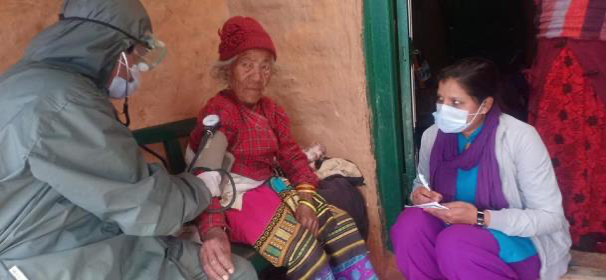Youth activated – first medical check-up via home visits
By: Johnny Baltzersen, CICED, chair
On the morning of April 6, CICED received a request from our partner JUST Nepal Foundation. The Corona virus had arrived in Nepal. The fear of widespread infection and a total meltdown of the modest healthcare system was palpable.
Neither JUST Nepal nor CICED could do much about the overall situation. But maybe we could do something in the Helambu area, where we have had great success in engaging young people through the Putting Youth on Centre Stage project.
JUST Nepal had the brilliant idea that young people should help spread information on how to most effectively avoid corona infection. JNF had been in contact with 77 of the youth camp participants, the mayor of Helambu, the head of the area’s health service and the leaders of the seven villages. Everyone was on board. Healthcare workers throughout the Helambu municipality had to be equipped with the most necessary protective equipment, hand washing and disinfection aids, as well as a pair of portable oxygen concentrators.
In particular, it would be important to reach the oldest, the poorest and especially the Dalits, the so-called ‘untouchables’, who are traditionally overlooked – even in times of crisis.
Before midnight d. On April 6, CICED had transferred the necessary 63,000 kroner for equipment and efforts in Helambu.
Now, a month later, we have the first report from Helambu:
Procuring medicines and equipment was not easy. Firstly, most of it was gone by the beginning of April. Firstly, Nepal was on lockdown with a curfew. Fortunately, fresh supplies arrived from China and India. Journalists could still move around. One of JNF’s board members has a press pass, so within a couple of weeks everything was ready for transportation to Helambu, 75 km north of Kathmandu.
With two doctors and Helambu’s health coordinator on the team, all households in the municipality received home health checks for the first time ever. A school was converted into a temporary hospital for possible corona patients. With the two mobile ventilators, patients in lucky cases could hopefully avoid the long trip to hospitals in Kathmandu.
In collaboration with the Helambu municipality, 11 health checkpoints were set up and equipped with infrared thermometers, disinfection equipment, protective masks and gloves, and essential medicines. All equipment was supposed to be supplied by 77 young people from the project, who were also involved in the early planning phase of the corona response, but with a strict curfew in place, doctors, healthcare workers and people with press passes had to distribute to the 11 checkpoints.
There are no confirmed cases of COVID-19 in Helambu. However, the extensive health checks via home visits have identified the chronic diseases that are known to be part of life at altitude and that vary with altitude. High blood pressure is common in the upper reaches, diabetes is common in the middle distance and asthma is common in the lower valleys.
The JNF team showed due diligence and brought plenty of doses of common medication for high blood pressure, diabetes and asthma. Medicines that people couldn’t get during the lockdown. And the two oxygen concentrators at the temporary hospital proved to be of great benefit in treating patients with bronchitis.
Mobile phone chains via the youth were set in motion to ensure the spread of COVID-19 relevant information in the local Tamang language of the area.
JNF has created an emergency preparedness network consisting of 18 youth in the seven villages, village leaders, health coordinators and the local doctors.
Although there are no confirmed COVID-19 cases in Helambu, the situation for most people is quite serious. The lockdown has meant a drastic drop in people’s earnings. Products cannot be sold in markets as usual, either locally or in Kathmandu. Many, especially Dalits, have returned to the villages from Kathmanu, where the typical day laborer jobs or other forms of menial labor are non-existent during the shutdown.
The Nepalese government has allocated 800 million rupees, almost 46 million kroner, for food aid to the poorest of the poor. It seems like a lot of money in a poor country, but the amount will be like a tailor in hell if the shutdown lasts much longer, and the Nepalese government is not exactly famous for efficient and corruption-free crisis management.
JNF and CICED can’t do much about that either. But we’re keeping our eyes and ears open to see if we can make a small difference in Helambu in other ways.
(Full report from JUST Nepal Foundation in English – click here
)







